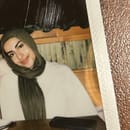For as long as I can remember, I felt like living in this country was not mine to live in. When I was growing up, my teachers didn’t have the same skin colour as me, not even a last name that was “difficult” to pronounce or wore the headscarf as my mother had.
Still, I walk into a store with a hijab wrapped around my head and aware of the weight I might carry amidst the heavy gazes — as if I’m being scrutinized with every move I make. The subway can be packed with tens of individuals, and I cannot help but notice the empty seat beside me — I am silently reminded that one might fear sitting next to me.
I question if this is a feeling I’m internalizing or if it’s the absolute truth. Then I see news stories and question if society has done a good enough job to truly protect people of colour who are the ones who are visibly being hurt by those who aren’t. And unfortunately, I’ve come to realize that this is just the world we live in. I cannot blame individuals who perceive me a certain way, but I can try to shift the false narrative.
Society tends to pose a Muslim woman to be oppressed or a Muslim man as a terrorist. I came across a video the other day where a man in his mid-20s said he never grew up knowing what the hijab represents or possesses. Growing up mistaking the hijab for a turban, he acknowledged knowing hardly anything about the Islamic faith beforehand. He expressed astonishment at how poorly the hijab is portrayed in the media. He felt that most people in society were similarly ignorant of his prior beliefs.
My hijab is a form of redefining the modern-day notion of beauty. To emphasize how genuine beauty transcends external looks, my hijab disregards the superficial normalities we see by emphasizing the humble qualities of an individual.
Brown people often find themselves having to explain to white individuals that they, too, have feelings and experiences that are deserving of acknowledgment and compassion. Muslim women have made enough of an impact with their message of peace, and we have done our part in how we present ourselves and the rationales behind our appearance. The media is now responsible for amplifying our voices, not restraining them.
Racial bias exists in many households where most of us or our parents falsely blame people of colour for acts they didn’t commit. In Canada, racialized individuals’ crimes are magnified, while white people’s transgressions are ignored.
In 2022, the United States Department of Justice reported over 13,000 hate crime offences and of the over 10,000 known offenders, over 50% were white, while the other 50% were different racialized individuals. Why are we all still treated as if we are divided from one another?
Western media acts as if the problem is not centred around white people, then it is not a problem. A minor interaction between two celebrities at the Oscars a few weekends ago concerns more people. You’re allowed to care about those things, but why are the suffering of minorities undeserving of the same prominence and attention? We have spent the majority of our history battling for freedom.
Due to these biases, society has grown an insensitivity towards racialized communities. These beliefs vary from: they’re always suffering with something, to they’re on the other side of the world, so it shouldn’t matter, or these groups are always in the middle of some crisis.
The people in these “unreachable” places have been forced to suffer through these situations due to our country’s actions.
Let’s look at the Palestine conflict. This event has been brought to mainstream media since Oct. 7, 2023, but has been ongoing for the last 75 years. There is an immeasurable rise of Palestinians in Gaza who have been forced to flee their homes, and tens of thousands have been massacred by bombs and airstrikes.
Western media disregards the ethnic cleansing Palestinians have been enduring for the last few decades while only portraying one side of the narrative. News outlets have been using terms along the lines of “have been killed” when referring to Palestinians and “have been murdered” when referring to Israelis.
While social media platforms are shadow-banning posts from users who show support for Palestine, viewers assume the other nation is the sole protagonist since they only see reports and events in a single country.
There is a clear lack of some non-racialized people’s inability to empathize with minorities. Why can’t Palestinian children be entitled to the same play and nostalgia of childhood as your white children? Just because they’re on the other side of the world does not set them apart from us.
These innocent children who hide under the rubble and are bombed by our country listen to the same music we do on Spotify, watch the same trending movies we have on Netflix and laugh about the unlaughable with their friends until their stomach goes numb — just like us.
As privileged individuals, we have collectively grown insensitive to their suffering. The pain of people of colour is something we are sadly familiar with seeing only in nations that are not in the West. It’s easier to stay desensitized because we cannot imagine the unimaginable.


